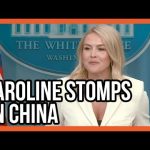President Trump’s bold tariff strategy is already proving effective, with nearly 70 nations scrambling to negotiate new trade deals with the United States. The move, once dismissed by critics as reckless, has forced foreign leaders to the table, signaling a major win for American economic sovereignty. Countries from Asia to Europe are now offering concessions to avoid steep tariffs, showcasing Trump’s unmatched dealmaking prowess. This rapid response confirms the president’s long-held belief that tough negotiations are the only way to end decades of global trade abuse against American workers.
caved quickly, slashing its proposed 90% tariff to zero after a single call with Trump. The communist nation’s sudden reversal highlights the power of the president’s “America First” approach. Meanwhile, signaled willingness to compromise, with officials praising the “lower than expected” 10% baseline tariff as a starting point for talks. Even longtime trade adversaries like are folding, offering to halve tariffs on $23 billion of U.S. goods. These developments expose the failure of past weak-kneed trade policies that left American industries vulnerable.
The administration’s 10% baseline tariff, set to punish countries exploiting unbalanced trade deals, has become a rallying cry for economic patriotism. Treasury Secretary Scott Bessent noted the surge of interest from foreign governments, with up to 70 nations now seeking negotiations. This tidal wave of diplomatic outreach proves Trump was right: the world respects strength, not endless concessions. The president’s critics, who predicted global isolation, now watch as allies and rivals alike line up to rework deals on America’s terms.
and , two nations accused of stiff-arming U.S. automakers for decades, are suddenly eager to talk. Japan’s prime minister personally called Trump to begin discussions, while South Korea’s acting president demanded immediate negotiations. These reversals reveal how Trump’s tariffs are dismantling foreign trade barriers that crippled Detroit for generations. The president’s team emphasizes that this isn’t just about tariffs—it’s about ending sneaky regulations and subsidies that locked American products out of key markets.
Democrats and establishment Republicans warned of economic chaos, but the facts tell a different story. Markets initially wobbled, but businesses are now applauding the chance to compete on a level playing field. As White House adviser Kevin Hassett put it, “Countries understand they bear the burden here”—a stark contrast to the doomsday predictions from coastal elites. The rapid negotiation pace shows foreign nations know the jig is up: America won’t tolerate being everyone’s piggy bank anymore.
Even , a frequent target of Trump’s trade critiques, is sending its economic minister to Washington for face-to-face talks. This comes after years of Mexico flouting trade obligations under NAFTA 2.0. The president’s willingness to hit our southern neighbor with tariffs—while still leaving room for dialogue—demonstrates the “carrot and stick” approach that defines his foreign policy. Critics who called Trump a loose cannon now eat crow as his calculated firmness yields results.
The left’s obsession with “global cooperation” always meant American surrender. Trump’s tariffs have flipped the script, forcing the world to cooperate on our terms. From leveraging its mineral reserves to fast-tracking a free trade deal, nations are discovering that fair treatment works both ways. This isn’t isolationism—it’s leadership. The president’s policies ensure that access to America’s thriving consumer market comes with strings attached: play fair, or pay up.
As negotiations accelerate, the media’s fearmongering about trade wars collapses under the weight of real-world results. Trump’s tariffs, far from causing economic ruin, have exposed the weak foundations of globalization’s “race to the bottom.” With manufacturing giants like Vietnam folding and allies like Britain compromising, the president delivers on his core promise: putting American workers first. The days of empty trade deals and stolen jobs are over—replaced by an era where America writes the rules, and the world follows.




